The Board of Directors of Nigeria LNG Limited (NLNG) has approved the supply of 100% of the company’s LPG production (Propane & Butane) to the Nigerian market.
This is according to a press release, signed by the General Manager, External Relations & Sustainable Development, Andy Odeh and found on the website.
According to the press release, the NLNG will prioritize the domestic market for 100% of its Butane production, otherwise known as cooking gas. Also, this development is aimed at increasing LPG availability in Nigeria, diversifying its uses and to support the Federal Government’s Gas initiative. NLNG is currently the highest single supplier of LPG into the domestic market, with an estimated 400,000 metric tonnes supplied in 2021.
The milestone is coming just three months after the company supplied its first propane cargo into the domestic market and has developed a scheme to sustainably supply propane for usage in cooking gas blending as well as in agro-allied, autogas, power and petrochemical sectors of the Nigerian economy to further deepen gas utilisation in Nigeria.
What they are saying
The Managing Director and CEO of NLNG, Dr. Philip Mshelbila, while commenting on the development said that the announcement marked the company’s strong commitment to the growth of the domestic LPG market and its passion to increase the utilisation of gas.
“Gas, as the cleanest of the fossil fuels, has become an essential energy source to be reckoned with during this energy transition period. Other countries are revolutionising their energy industry to cut down on carbon emissions drastically. Nigeria should not be left out in this drive, considering its abundant gas resources. Gas is essential for life and living at the moment, because it can support everything we will need to develop our economy and create better living standards for Nigerians. We need to change the narrative, and NLNG is being pragmatic about it,” he said.
He also added that, “We are ardently following up on the commitment we made in March 2021 at the NLNG-sponsored pre-summit conference of the Nigeria International Petroleum Summit (NIPS) 2021 organised by the Federal Ministry of Petroleum Resources to support the Decade of Gas declaration by the Federal Government. We are driven by our vision to remain a globally competitive LNG company helping to build a better Nigeria and are making a reality of our collective dreams that one day we can switch all cooking fuels to gas, and power our vehicles with gas as encapsulated in the government’s National Gas Expansion Program and the Autogas Policy.
“Committing 100% of our LPG supply is a major milestone in our journey of domestic gas supply. We supplied our first Butane (LPG) cargo into the domestic market in 2007, which helped to develop over the years the LPG industry in Nigeria from less than 50,000 tonnes to over 1 million tonnes market size annually by the end of 2020. In 2021, we increased our LPG supply commitment from 350,000 metric tonnes (or 28 million 12.5kg cylinders) to actual delivery of 400,000 metric tonnes (or 32 million 12.5kg cylinders) thereby directing most of our production into the domestic market. But this was not enough for NLNG, hence this commitment to do all that we possibly can and supply 100% of our LPG production to the domestic market.”
Backstory
Recall, that the prices of cooking gas surged significantly in recent months, while the federal government has assured Nigerians to take steps to bring down the cost of the highly in-demand product.
The GMD of the NNPC, Mele Kyari at the inauguration of a 120-metric tonnes LPG storage and bottling plant by Emadeb Energy Services Limited in December 2021, said that the company will try to increase supply in the local market in a bid to drive the price down.
He said, “Two things are in play. One is the supply in the international market of gas. It moves with the price of every other petroleum product including crude oil and its derivatives. So definitely, it is a reflection of what is happening in the international market. However, what we are doing is to increase supply and once supply increases, price will come down.”









